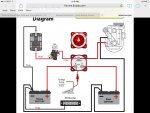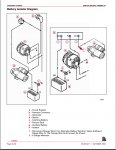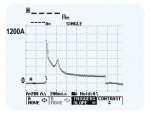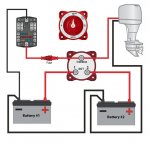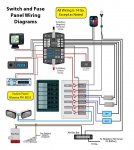Re: Fuses needed or not?
Just to add a little perspective here, I would submit that while no fusing is required in a starting circuit, there is nothing that prohibits it either.
Concur
The 100 Amp dual element time delay type fuse in the graph below would give a guy about 200 Sec's (3.3 mins) of continues cranking @ the typical 200 Amps before it popped. Plenty of time to melt the wires, smoke your starter and try to get started up BUT, would assume here, a typical person would only be cranking in say 5/10/20?/30? sec. shots max though, right? ("The starter motor may be damaged if operated continuously. DO NOT operate continuously for more than 30 seconds. Allow a 2 minute cooling period between starting attempts").
BUT, for example, in say that 1000 amp situation, the fuse graph shows it would pop but, only after about 2 secs. of 1000 continuous amps(that's about 50 times longer than that 40 ms pulsed 1000 amps of typical inrush seen in the crank cycle graph, that is way too fast and most likely won't blow this type of fuse according to the graph) With a hard @$$ short to ground though of perhaps 4000 amps(4x the inrush), it's opening up in .01 secs., or vaporizing it in .02 secs.
The crank cycle graph shows the typical motor is down to this 200 amps in about 400 ms.
But sure, A guy gets in the boat, hits the key, the boat doesn't start, the guy stays on the key(or stuck key switch/starter solenoid, whatever), continuously drawing 200 amps for more than 30 sec's. Say we're at the 2 minute mark and no one has reached for/found the batt off switch,(the ABYC
guidelines recommends those, but they're not are "mandatory", the sheriff has never inspected mine because they're not required, just SMART/NICE to have!! Especially in a boat), panic ensues, the wife is yelling, kids are screaming, the dog bailed out and is swimming for shore and now smoke is rolling out of the starter and the wires are dripping off molten insulation from red hot copper all at the same time with this 100 amp fuse or not......
Wouldn't it though be nice and smart?(especially in a boat), that if the current went through the roof, say to that 1000 or 4000 amps or higher during the above "situation"(or out of the blue even) due to the wires being less their insulation now and perhaps shorted to one another and/or the starter winding's finally shorted out, having that 100 AMP fuse opening up right about now?
Or worst worst case, it stayed at 200 amps but, opening up by default/design at that 3 minutes point? I have had starter solenoids stick/weld closed on me more than once.
Maybe I'm too "progressive" but thinking this as purely a safety idea isn't too out of control w what some advancements are brings these days and showing in different apps. Especially if it's tested, proven reliable and underwritten by industry safety commissions and the like.





















